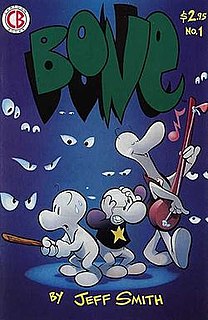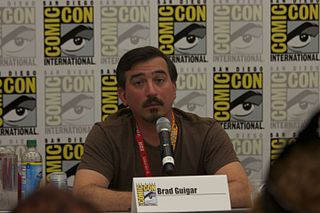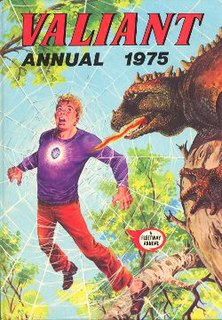Related Research Articles

Milton Arthur Paul Caniff was an American cartoonist famous for the Terry and the Pirates and Steve Canyon comic strips.

Knockout may refer to one of two British comics. The original series, published by the Amalgamated Press, started on 4 March 1939 and ended on 16 February 1963, when it merged with Valiant. The second series, published by IPC Magazines, ran from 12 June 1971 to 23 June 1973, when it merged with Whizzer and Chips.

Bone is an American independently-published graphic novel series, written and illustrated by Jeff Smith, originally serialized in 55 irregularly released issues from 1991 to 2004.

Stephen Ross Gerber was an American comic book writer and creator of the satiric Marvel Comics character Howard the Duck. Other works include Man-Thing, Omega the Unknown,Marvel Spotlight: "Son of Satan", The Defenders,Marvel Presents: "Guardians of the Galaxy", Daredevil and Foolkiller. Gerber often included lengthy text pages in the midst of comic book stories, such as in his graphic novel, Stewart the Rat. Gerber was posthumously inducted into the Will Eisner Comic Book Hall of Fame in 2010.

Zit was an adult British comic that was published by Humour Publications UK, beginning with a free sample issue in January 1991, and with issue 1 in February 1991.

Alexander "Ally" Sloper is the eponymous fictional character of the British comic strip Ally Sloper. First appearing in 1867, he is considered one of the earliest comic strip characters and he is regarded as the first recurring character in comics.

Dana Claire Simpson is an American cartoonist, best known as the creator of the syndicated comic strip Phoebe and Her Unicorn, as well as the long-running webcomic Ozy and Millie. Other works created by Simpson include the political commentary cartoon I Drew This and the alternate reality drama comic Raine Dog.

Brad Guigar is an American cartoonist who is best known for his daily webcomic Greystone Inn and its sequel Evil Inc.
The Eagle Awards were a series of awards for comic book titles and creators. They were awarded by UK fans voting for work produced during the previous year. Named after the UK's Eagle comic, they were launched in 1977 for comics released in 1976.
Boxcar Comics is a webcomic collective. It was founded in 2005 by Zach Miller, the author of Joe and Monkey, with 12 members. Soon after, Mitch Clem and Tom Brazelton, the authors of Nothing Nice To Say and Theater Hopper, respectively, left the Dayfree Press syndicate to join Boxcar.

Denis Gifford was a British writer, broadcaster, journalist, comic artist and historian of film, comics, television and radio. In his lengthy career, he wrote and drew for British comics; wrote more than fifty books on the creators, performers, characters and history of popular media; devised, compiled and contributed to popular programmes for radio and television; and directed several short films. Gifford was also a major comics collector, owning what was perhaps the largest collection of British comics in the world.

Valiant was a British boys' adventure comics anthology which ran from 1962 to 1976. It was published by IPC Magazines and was one of that company's major adventure titles throughout the 1960s and early 1970s.

Wham! was a weekly British comics magazine published by Odhams Press. It ran for 187 issues from 20 June 1964 to 13 January 1968, when it merged into its sister title Pow!

Smash! was a weekly British comic book, published initially by Odhams Press and subsequently by IPC Magazines, from 5 February 1966 to 3 April 1971. After 257 issues it merged into Valiant.
Deflocked is a comic strip written and illustrated by Jeff Corriveau, which follows the adventures of four major characters, described as "deliriously funny yet seriously dysfunctional." The strip, which Corriveau originally based loosely on Hippocrates' Four Humours attempts to detail relationships similar to Norman Lear’s All in the Family through the exploits of Mamet, a wayward sheep, the dog siblings Cobb and Rupert, and Tucker, an 8-year-old boy raised by the dogs. The strip was syndicated in May 2008.
The history of comics has followed different paths in different parts of the world. It can be traced back to early precursors such as Trajan's Column, in Rome, Egyptian hieroglyphs and the Bayeux Tapestry.
Terrence St John "Terry" Fuckwitt is a recurring character in the British comic Viz, in a strip subtitled "the unintelligent cartoon character".

The Phoenix is a British weekly story comic for children aged 6–12, published by David Fickling Comics Ltd. The comic was launched on 7 January 2012 with a preview issue which was released in late 2011. The comic is often considered a successor to The DFC: both are published by the same people and many of The Phoenix's creators had worked on The DFC.

O Menino Maluquinho is a comic book and comic strip series created by Brazilian writer and cartoonist Ziraldo. It was based on the eponymous children's book published in 1980 which for many years was regarded as a classic of children's literature in Brazil, getting spun off into movies, plays and TV series. The comic books were published by Abril and Globo from 1989 until 2007. It was Ziraldo's second series of comic books, after "Turma do Pererê".
References
- ↑ Interview with David Fickling, saviour of the great British comic, The Times , May 10, 2008
- ↑ BCA Winners 2015 Archived 2015-12-08 at the Wayback Machine , British Comic Awards , Nov 13, 2015